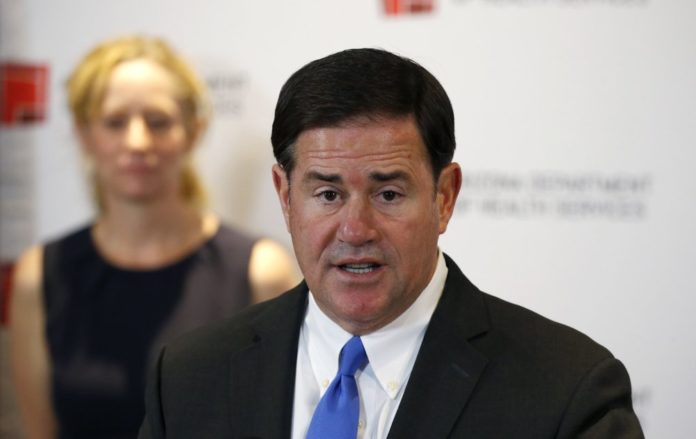
With little hope of getting the 5,000 ventilators it requested from the dwindling national stockpile, Arizona has revised its request down to just the 500 it expects to need soon to treat coronavirus patients, the state’s health director said.
Most of the ventilators would be used to equip a Phoenix hospital that shut down last year but is being reopened as an acute care facility with all ICU beds, Health Services Department Director Dr. Cara Christ said in an interview. About 50 would be sent to the Navajo Nation, where a severe coronavirus outbreak is ongoing.
The health department reported Monday that the state now has 2,465 known coronavirus cases with 65 known deaths. Christ expects cases to peak late this month and hospitals to see their maximum patient load in May.
Meanwhile, Arizona saw a massive increase in unemployment filings last week as businesses continue to cut staff. The state reported it had 129,215 new claims last week, bringing the three-week total to more than 247,000. The average before the virus hit was about 3,500 claims a week.
The state and the Army Corps of Engineers has been reviewing locations to add hospital space in Phoenix and Tucson and a contract to reopen St. Luke’s Medical Center is close to being finalized. Work to get the facility just east of downtown Phoenix ready to reopen is expected to begin this week and take about three weeks.
Christ had originally asked federal officials for 5,000 ventilators, based on projections of Arizona’s needs, and the request was approved by federal officials.
But a review of existing ventilators, downward projections on need and the reality that there was no way the state could get that many led to the revised request, Christ said in Friday’s interview. The federal government only has about 10,000 ventilators in reserve, and New York state alone had requested 30,000 and got only 4,000, Christ noted.
“When we heard what New York got in comparison to their request … we became highly aware that we weren’t going to get those 5,000 ventilators,” she said.
A revised estimate shows the state will need about 1,500 ICU beds with ventilators to treat virus patients, Christ said. The state has 1,500 beds with ventilators already, about a third in use, so it needs to add about 500 more to meet expected demand.
The agency is also scouring the state’s outpatient surgical centers for bed space and equipment like ventilators that the most critically ill patients may need, and looking to anesthesia and CPAP machines used for sleep apnea that might be converted into ventilators.
For most people, the new coronavirus causes mild or moderate symptoms, such as fever and cough that clear up in two to three weeks. For some, especially older adults and people with existing health problems, it can cause more severe illness, including pneumonia and death. The vast majority of people recover.
The state has about 16,900 licensed hospital beds and expects to need 7,000 to 13,000 more to treat virus cases. Doug Ducey on March 19 ordered a statewide halt to elective surgeries to save needed equipment and free up space, and hospitals are now sitting at about 50% to 60% of capacity, Christ said.
That means the early surge of cases shouldn’t overwhelm hospital capacity as the state works to reopen hospitals such as St. Luke’s, build temporary hospitals and possibly ask the military to open three field hospitals.
The Navajo Nation is working with state and federal officials to set up isolation areas on the reservation so that its hospitals aren’t overwhelmed. Tribal President Jonathan Nez said health officials will extend a daily nighttime curfew throughout the weekend. The tribe had 384 cases and 15 deaths on its reservation that extends into Arizona, New Mexico and Utah.
“Our health care system cannot manage the growing numbers of patients and those who need to be admitted,” Nez said.
Ducey on Monday issued an order barring evictions of commercial businesses and non-profits through May 31 if they can’t pay rent because the virus has affected their revenue. He also urged landlords to defer rent payments. The Republican had earlier blocked evictions for 120 days for renters who can show they’ve been affected by the virus.
Ducey has also ordered schools, bars, movie theaters and restaurants closed to all but take-out services.
Republished with the permission of the Associated Press.














